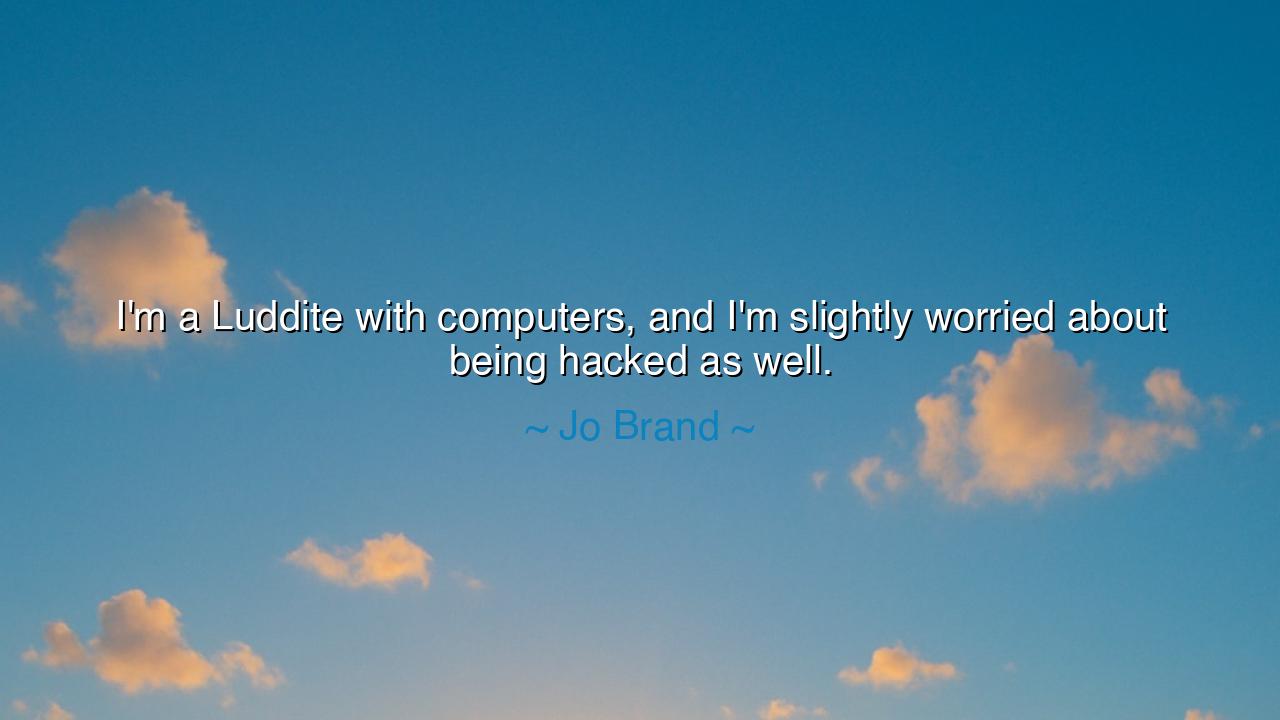
I'm a Luddite with computers, and I'm slightly worried about






In the ever-changing tide of human progress, there are those who find themselves swimming against the current, cautious of the new technologies that define the modern age. Jo Brand, in her witty yet revealing confession, says, “I’m a Luddite with computers, and I’m slightly worried about being hacked as well.” In these words, she captures a sentiment that has echoed throughout history: the fear and uncertainty that arise when the tools we create begin to surpass our understanding or control. Just as the Luddites of the early 19th century resisted the rise of machines that threatened their livelihoods, so too do many in our age find themselves wary of the growing power of technology.
The Luddites—those who destroyed machines during the Industrial Revolution—were not simply rebels against progress; they were individuals caught in the storm of change, watching as machines replaced the craftsmanship and skills that had once been the bedrock of their lives. These artisans, faced with the relentless advance of technology, saw their worlds upended, their livelihoods threatened by the very tools that were meant to make life easier. Yet, the lesson of the Luddites is not merely one of resistance but of adaptation. They were heroes of a sort, standing firm in their values even as they faced the overwhelming tide of progress. Their rejection of machines was not an indictment of technology itself, but a cry for balance—a plea that as we advance, we must not lose sight of the human connection that makes us who we are.
Brand’s words, though spoken in modern context, echo this ancient tension between the human spirit and the tools it creates. Today, we live in a world where computers, internet, and social media shape the very fabric of our existence. We are more connected than ever, yet the dark side of this interconnectedness—hacking, identity theft, and the loss of privacy—casts a long shadow over our lives. Just as the Luddites feared the machines would strip away their humanity, many today fear that the technology we rely on may do the same. Hackers, lurking in the depths of the digital world, are the modern-day invaders, disrupting the peace and security we once took for granted.
Consider the story of Socrates, the ancient philosopher who, while shaping the foundations of Western thought, found himself threatened by the new technologies of his time—the written word. Socrates, a man of dialogue and conversation, believed that the written word would diminish the ability of humans to think deeply and critically. His resistance to this form of communication was not a rejection of knowledge, but a fear that new tools could lead to the erosion of the human connection to thought and understanding. Similarly, in the modern world, there is a growing concern that our dependence on computers—while offering unprecedented access to knowledge and connection—may also alienate us from the essence of human interaction and individuality.
The hackers of today, much like the invaders of ancient cities, seek to break through the defenses we have built around our lives. They exploit vulnerabilities, much like how ancient thieves used to find weaknesses in the walls of cities. The vulnerability we face today is not just in the tangible world, but in our digital lives, where our personal information, our very identities, are held captive by the systems we have created. Jo Brand's wariness of being hacked is not just a modern concern; it is a reflection of a timeless fear: that the tools we create to improve our lives can, in turn, be used against us. The very machines that were meant to enhance our lives have now become sources of vulnerability, their very presence serving as a reminder of our dependence on forces that lie beyond our control.
The lesson we must learn from this tension between technology and humanity is one of balance and awareness. Just as the Luddites did not seek to destroy progress, but to understand it, so must we embrace the advancements of the digital age without losing our humanity. We must wield our technological tools with wisdom, understanding that their power must be tempered by responsibility. Just as the great thinkers of the past understood the limits of their tools, so must we recognize the limitations of our own technology. We must not be enslaved by it, but use it to enhance the connections that truly matter—those between people, between ideas, and between the hearts and minds of individuals.
So, let us heed the wisdom of both the ancients and the modern voices that call for caution. Computers and technology are powerful forces that have the potential to create a better world, but only if we use them wisely. Just as the Luddites resisted not the machines, but the unchecked power they represented, we too must learn to embrace technology while protecting what is human within us. Let us cultivate the wisdom to balance the digital with the personal, ensuring that as we move forward, we do not lose sight of the very essence of who we are. In this way, we can navigate the digital age with both courage and caution, safeguarding our freedom, privacy, and humanity in the face of the machines we have created.






AAdministratorAdministrator
Welcome, honored guests. Please leave a comment, we will respond soon